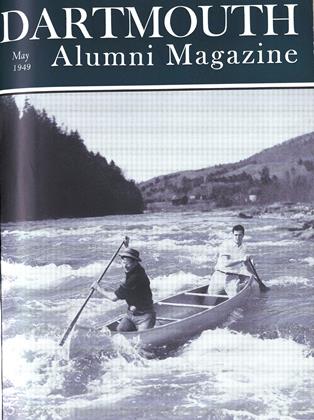It was a sad farewell that the inmates of Ohio Penitentiary gave their "friend," Dr. John Bernard C. Eckstorm '98, chief medical officer of the prison, on January 1, the day of his compulsory retirement. But it was mixed with profound appreciation for the eight years of outstanding service and kindness beyond duty that the 75-year-old doctor had rendered the prison. A testimonial signed by 3,000 inmates is a rare indication of the affection in which he was held.
The ability of one of Dartmouth's greatest halfbacks to get things done is amply shown in the many changes he helped bring about in the prison. Most widely known is the world "eye bank." By willing their eye corneas to this bank, many condemned men feel that they have done something to repay their debt to society. A modern hospital, x-ray clinic, optical and dental departments, are among the other improvements for which he is largely responsible.
When he found that there weren't enough eyeglasses to go around among the prisoners and saw the resulting dangerous idleness, "Doc" made an appeal for old, discarded eyeglasses. People all over the nation responded and 8000 inmates have since been fitted with old glasses made new.
Although primarily a physician, Dr. Eckstorm still practiced a philosophy that "the best medicine for men in prison is laughter." Through his efforts, many of the shows that entertained the city of Columbus were enjoyed by the prisoners.
He shared his life-long interest in athletics with his men, too, inviting many of the wrestlers whom he knows from his work as medical examiner for the Boxing Commission in Columbus, to perform at the prison. And he was one of the staunchest boosters of the penitentiary's baseball team. The new outlook on life which he gave many prisoners, however, was more a product of his own warm humor than the shows or athletic events he provided.
Using the same methods that he used with his own children and grandchildren, "Doc" Eckstorm rehabilitated many of those unfortunates.whose stories are those of neglect. Reared with country boys in a small Minnesota town and city boys on the streets of Chicago, he knows all kinds of boys. When he captained the champion ship '97 football team and later coached at Kenyon and Ohio Medical Colleges and Ohio State, he learned to understand them in the field of sports. Then at 67, when he was able and ready to retire from the long medical career which he had begun in 1903, he accepted the prison medical post. It was his success at working with the best kind that prompted him to try serving the so-called "worst." His experience at the Penitentiary convinced him that all boys are fundamentally the same. Treat them fairly and they will play squarely in return.
Jan. 1 may have been the day of Dr. Eckstorm's compulsory retirement, but it is impossible to retire when you live by a personal creed of helping people. That's why he has taken another job, the directorship of The National Guide to the Blind Foundation. Besides returning to his private medical practice, he expects to be busier than ever with his work in amateur sports. Still physician for the Columbus boxing commission, he confessed recently, "I may have to give this up when I hit the 100 mark, but maybe not."
"DOC" ECKSTORM '98
 View Full Issue
View Full Issue
More From This Issue
-
 Article
ArticlePAUL SAMPLE
May 1949 By HERBERT F. WEST '22 -
 Class Notes
Class Notes1929
May 1949 By F. WILLIAM ANDRES, EDWIN C. CHINLUND, GEORGE B. REDDING -
 Class Notes
Class Notes1918
May 1949 By ERNEST H. EARLEY, DONAIJS L. BARR, RICHARD A. HOLTON -
 Article
ArticleThe Experimental Theatre
May 1949 By BENFIELD PRESSEY, -
 Class Notes
Class Notes1931
May 1949 By A. W. LAUGHTON, WILLIAM H. SCHULDENFREI, EDWIN F. STUDWELL -
 Class Notes
Class Notes1934
May 1949 By FRANKLYN J. JACKSON, WILLIAM H. SCHERMAN
Article
-
 Article
ArticleWINTER CARNIVAL
March 1920 -
 Article
ArticleThree New York Alumni Get First Annual Service Awards
June 1955 -
 Article
ArticleThe Boom in Art Electives
APRIL 1964 By D.B. -
 Article
ArticleSKATING TEACHER JOINS STAFF
February 1940 By Edward Fritz '40 -
 Article
ArticleSTABILIZATION BY SPECIE PAYMENTS
April1935 By Edward Tuck '62 -
 Article
ArticleFROM THE PRESIDENT
OCTOBER • 1987 By James O. Freedman

